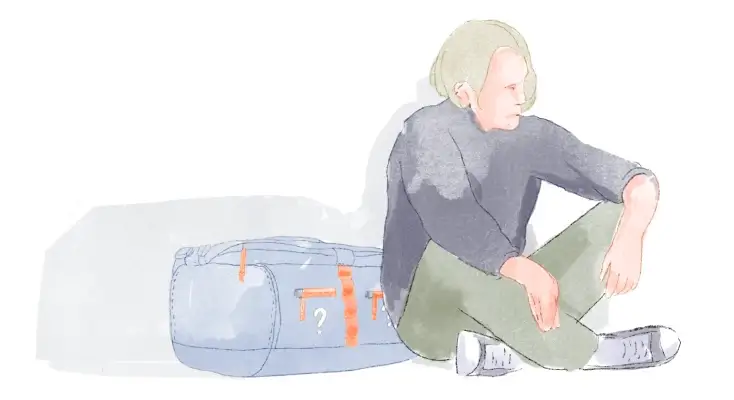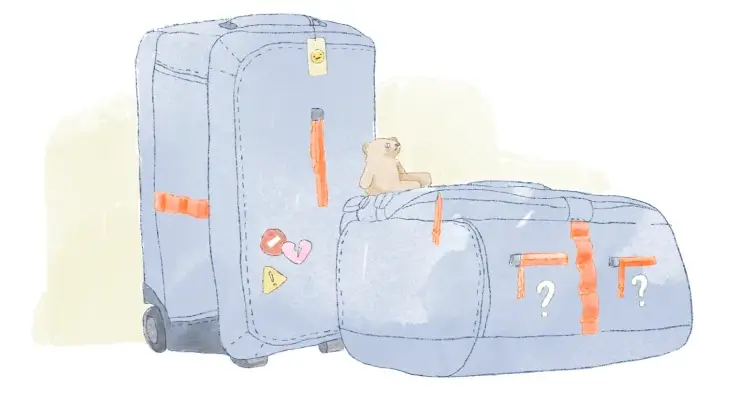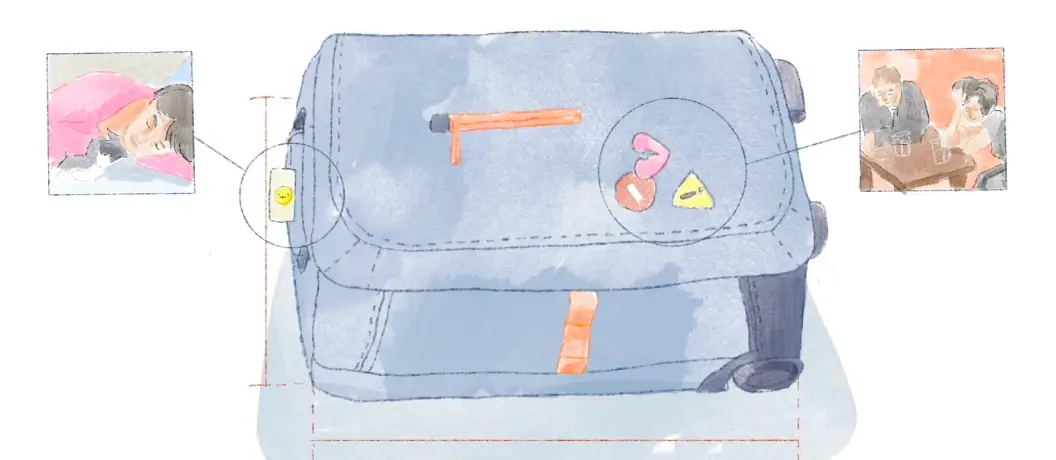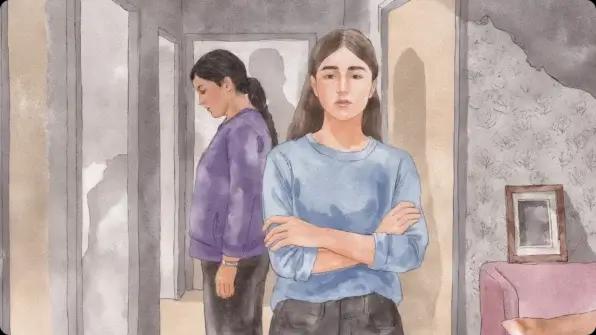While Reddit users discuss whether it is “bad to not want to date someone with lots of emotional baggage,” people with unresolved traumas from the past can experience real struggles to form and maintain their relationships, which also affect their mental health.
But what exactly is the meaning of emotional baggage, especially when you are in a relationship? This detailed guide goes beyond the term that may stigmatize people who have unresolved trauma that affects their lives today.
Rather, this article reveals the signs and causes of past traumas that can hold you back from growing personally and in your relationships.
What is emotional baggage?
The term emotional baggage refers to the unresolved emotional pain, stress, or negative experiences from the past that a person carries into their present life. In a nutshell, it’s unresolved trauma that can influence you in the present. It often comes from unprocessed childhood trauma or the scars of past toxic relationships.
As a metaphor, emotional or mental baggage is made up of unresolved problems from the past that we carry into the present, like heavy suitcases that we can not see.
This baggage can show up in many ways—like trust issues, fear of abandonment, difficulty regulating emotions, or patterns of self-sabotage.
This relationship trauma, if left unresolved, can result in mistrust, fear of intimacy, low self-esteem, self-doubt, feeling unworthy of love, or even depression and anxiety disorders.
Check if your past from childhood can influence you now with a quick self-discovery test.
Is it emotional baggage or just a bad day?
Sometimes, we might mistakenly attribute these signs to just having a rough patch. However, the distinction lies in the persistence and depth of these feelings. Emotional baggage isn’t just a momentary inconvenience; it’s an ongoing weight that shapes our responses to life’s challenges.
10 Signs you’re carrying emotional baggage
Is there an event that continues to elicit strong emotions no matter how much time has passed? Are there patterns in your relationships that seem all too familiar, even if they are unproductive or toxic?
These are signs that may hint at unresolved emotional issues. Let’s look at them closer.
Sign #1. Chronic self-doubt
Self-worth and emotional baggage share a symbiotic relationship. When you have unresolved trauma, self-loathing can quickly become a mode of operation.
Persistent negative self-talk, feelings of inadequacy, or an unyielding sense of unworthiness are powerful indicators of underlying repressed trauma that have been left unaddressed.
Sign #2. Fear of abandonment
You may struggle with an irrational fear that those close to you will leave. This could be because of abandonment trauma — your childhood experience when caregivers might have left you or were emotionally unavailable.
For example, you as a child experienced the divorce of your parents, so now that fear of being left may result in acting more clingy in your current partnership. This is also called fawn trauma response.
These types of unconscious thoughts and responses prevent you from fulfilling your needs in your current relationship by just focusing on the needs of your partner.
Sign #3. Feeling hyper alert all the time
Our brain’s fear center activates when we encounter frightening events. This puts us in a “fight, flight, or freeze” state to help us stay alive. That being said, your brain may stay in this state of high alertness even after the event is over.
Even when the situation is not actually dangerous, your brain may produce a response to whatever it perceives as potentially dangerous. This can also make you overly defensive, ready to release anger from the past to a person who actually wasn’t the cause of that.
Sign #4. Pervasive trust issues
Trust is like the glue of personal and professional relationships. However, traumatic experiences or a history of betrayal can leave you mistrustful in any new relationship. The term “betrayal trauma” was first used by psychologist Jennifer Freyd to describe what happens when someone or something they rely on breaks their trust.
If you can not really trust the people around you and are waiting with a “knife in the back” at any time, it is likely to be emotional baggage from past experiences.
Sign #5. Attachment issues
A lot of people who have been through trauma have problems with attachment. Generally, problematic attachment experiences in the past form or affect our attachment style, according to the theory by John Bowlby.
The effects of this attachment trauma can be that it’s hard for you to bond with your partner or friends as an adult. Otherwise, you become too attached to one person, which can lead to dependence.
Sign #6. Fear of rejection
Just thinking about being rejected can be devastating for trauma survivors. Because of the stress and anxiety, you can feel fear of rejection and trauma, which can keep you from forming new relationships or making strong bonds.
Sign #7. You are not enjoying your life
Living without joy is hard, and emotional baggage can make the joy that should be a natural part of life dim or disappear. When someone stops doing things they love, interacting with people, and avoids being in places that used to make them happy, it is often a sign that the baggage has become too heavy to carry.
Some feelings of toxic shame or guilt complex from the past may prevent you from feeling full and enjoying your life. Also, it can be a sign of depression.

Sign #8. Emotional numbness and emptiness
Traumatic events in childhood, whether they happen all at once or over a long period of time (complex trauma), can leave you feeling empty and numb in adulthood.
Perhaps you try to avoid emotional pain by being emotionally distant, finding it hard to feel emotions or attach to people. Also, it can lead to complete dissociation as one of the trauma responses.
Sign #9. Suppressing your authentic self
When one’s actions are congruent with and supported by one’s fundamental principles, one is authentic. So, someone who has unresolved emotional issues fromthe past and unresolved trauma might realize that their actions do not always match up with their true beliefs and needs.
This person might want to show love, but the emotional openness of that expression could result in them stopping doing that. For example, because they believe it shows how vulnerable they are.
Sign #10. Struggling to set boundaries
Mental health experts tell us that healthy boundaries are crucial for maintaining mental and emotional well-being. However, many of us who have been through trauma and carry a lot of emotional baggage may find it hard to set and stick to boundaries.
We may also overcommit and feel like we can not say no. This lack of self-assertion can be a veil for deeply rooted fears of not being loved or enmeshment trauma from the past.

The roots of our emotional baggage
Emotional baggage comes from past emotional experiences you couldn’t handle. Common causes of our emotional baggage may include:
Unresolved childhood trauma
We learn how to act and feel by forming our feelings during our formative years. Parental relationships, peer relationships, and the ups and downs of school fights and flights are some of the most important experiences in our lives. They shape our insecurities, fears, and unresolved traumas.
Past traumatic events
Some experiences aren’t just monumental; they’re so significant for people. Victims of abuse, war veterans, or survivors of natural disasters carry with them the cataclysmic tremors of their past.
Trauma, left unaddressed, becomes an enduring fixture in the emotional baggage of our lives. For instance, after a disaster like an earthquake, people can have a wide range of thoughts and actions. Even the smallest shaking-like situation can cause intense or unpredictable feelings, unwanted flashbacks, and anxiety attacks, even if it’s safe. [1]
Unmet expectations and betrayals
Our emotions get popped when our hopes and dreams are dashed, whether it is because a partner cheats on us, a friend betrays us, or a life goal falls through. These events often leave a painful mark that is felt for a long time after they happen. One study shows the long-term effects of partner betrayal trauma and its influence on new relationships and mental health, too. [2]
Another very clear example is when adults who are supposed to care for children neglect or even abuse them. As a result of a dysfunctional family, the children may have trouble forming bonds with others and consistently believe that trusting others is risky and will lead to adverse consequences.
How does emotional baggage influence our bodies?
Mind-body connection theory says that a person’s emotional and mental health affects their physical health. New research backs up this idea, demonstrating that unresolved emotional experiences can manifest as physical symptoms. [3]
Renowned trauma researcher Bessel van der Kolk has provided extensive evidence that trauma is stored in the body through changes in the autonomic nervous system (ANS), brain structures such as the amygdala, hippocampus, and prefrontal cortex, and persistent muscle tension patterns.
His research indicates that when traumatic experiences are not fully processed, they can become “trapped” in the body, leading to long-term physiological and psychological distress. [4]
Brain chemicals and the body’s physical responses work together in a complicated way to store trauma.As a result of unresolved trauma, the sympathetic branch of the ANS, which sets off the body’s “fight or flight” response, often stays overactive.
Long-term activation can put the body in a constant state of “fight, flight, or freeze,” which makes it hard for it to return to a balanced, relaxed state. In the long run, this stress response causes a lot of physical problems, like tension, pain that will not go away, digestive issues, and issues with the immune system. [5]
Therefore, emotional baggage is not just a mental burden; it also has real physical effects that affect our health and well-being as a whole.
How to let go of emotional baggage
It takes a brave and honest look inside to realize that you may be carrying around emotional baggage. Without the layers of self-awareness, you may miscalculate the load you carry. Also, you can try:
- Understand that it does not define you. Seeing your emotional baggage as separate from your “identity” is the first thing that you need to do to accept its existence. Additionally, you can work toward more healthy coping mechanisms with a therapist.
- Validate your experiences: Self-validate by admitting what you went through and how it still affects you in your current life. There are books about childhood trauma that have stories about things that people have been through.
- Mindfulness and meditation. Doing mindfulness exercises can help us find peace in stormy emotions from past trauma. By anchoring our consciousness in the present moment through meditation, we can build a life raft that will support us through the highs and lows of our emotions.
- Understand what you actually feel. Being aware of and naming your emotions is better than suppressing them. In other words, you have to feel a variety of them and be aware of them.
The Breeze Self-Discovery app offers various psychological tests to help users understand and manage emotional baggage. You could start by taking a test to find out your EQ level, for example.
Or it can be others, like an attachment style test that can help reveal patterns in relationships that may stem from unresolved emotional baggage or mood assessment that evaluates emotional well-being and unresolved sadness.
FAQ
1. How to get rid of emotional baggage?
Admitting that you have emotional baggage is the first thing you can do. Give yourself some time to think about what is causing this heavy load. Then, you can learn to let go of past traumas and the tension they cause in your body through mindfulness and meditation, professional therapy, or intentional movement to work through your feelings.
2. What does “emotional baggage” mean in relationships?
The term emotional baggage refers to the unresolved emotional pain, stress, or negative experiences from the past that a person carries into their current or future relationships. These past experiences, if left unprocessed, can influence thoughts, behaviors, and emotional responses, potentially affecting relationship dynamics. People may unconsciously project fears, insecurities, or patterns from previous relationships onto their new partners, which can create challenges in communication and emotional connection.
3. Is it possible to heal from past trauma?
Yes, healing from past trauma is possible. It involves acknowledging the pain, seeking support (therapy, self-reflection, or family members), and developing coping strategies. With time, self-awareness, and the right resources, you can process their experiences, build resilience, and move forward in healthier ways.
4. How does emotional baggage affect health?
Avoiding dealing with emotional baggage can cause stress, anxiety, depression, prevent building healthy relationships, and overall decline in psychological well-being. Additionally, it might lead to physical health issues such as headaches, tiredness, high blood pressure, and a weakened immune system.
Sources
- American Psychological Association. (2013, August 15). Recovering emotionally from disaster.
- Lonergan, Michelle & Brunet, Alain & Rivest-Beauregard, Marjolaine & Groleau, Danielle. (2020). Is romantic partner betrayal a form of traumatic experience?: A qualitative study. Stress and Health.
- Hernandez, R., Bassett, S. M., Boughton, S. W., Schuette, S. A., Shiu, E. W., & Moskowitz, J. T. (2017). Psychological Well-Being and Physical Health: Associations, Mechanisms, and Future Directions. Emotion Review.
- Bassel van der Kolk, B. A. (2014). The body keeps the score: Brain, mind, and body in the healing of trauma. Viking.
- Solomon, Eldra & Heide, Kathleen. (2005). The Biology of Trauma. Journal of Interpersonal Violence. 20. 51-60.
Disclaimer
This article is for general informative and self-discovery purposes only. It should not replace expert guidance from professionals.
Any action you take in response to the information in this article, whether directly or indirectly, is solely your responsibility and is done at your own risk. Breeze content team and its mental health experts disclaim any liability, loss, or risk, personal, professional, or otherwise, which may result from the use and/or application of any content.
Always consult your doctor or other certified health practitioner with any medical questions or concerns
Breeze articles exclusively cite trusted sources, such as academic research institutions and medical associations, including research and studies from PubMed, ResearchGate, or similar databases. Examine our subject-matter editors and editorial process to see how we verify facts and maintain the accuracy, reliability, and trustworthiness of our material.
Was this article helpful?






